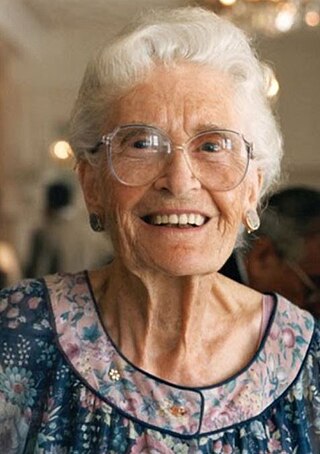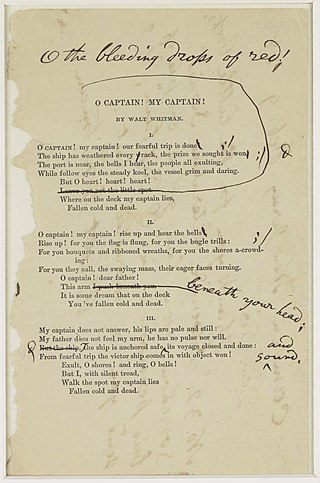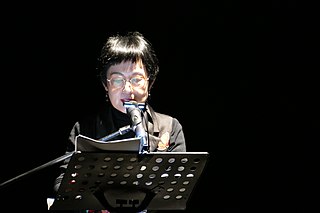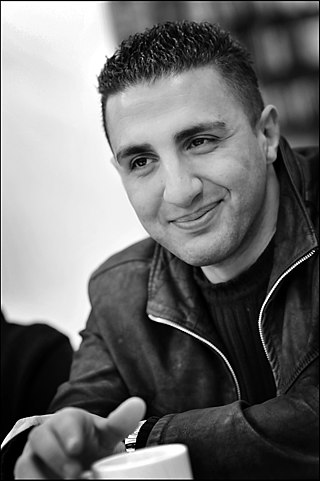
The word ekphrasis, or ecphrasis, comes from the Greek for the written description of a work of art produced as a rhetorical or literary exercise, often used in the adjectival form ekphrastic. It is a vivid, often dramatic, verbal description of a visual work of art, either real or imagined. Thus, "an ekphrastic poem is a vivid description of a scene or, more commonly, a work of art." In ancient times, it might refer more broadly to a description of any thing, person, or experience. The word comes from the Greek ἐκ ek and φράσις phrásis, 'out' and 'speak' respectively, and the verb ἐκφράζειν ekphrázein, 'to proclaim or call an inanimate object by name'.

George Szirtes is a British poet and translator from the Hungarian language into English. Originally from Hungary, he has lived in the United Kingdom for most of his life after coming to the country as a refugee at the age of eight. Szirtes was a judge for the 2017 Griffin Poetry Prize.

Dorothy Kathleen May Livesay, was a Canadian poet who twice won the Governor General's Award in the 1940s, and was "senior woman writer in Canada" during the 1970s and 1980s.

"O Captain! My Captain!" is an extended metaphor poem written by Walt Whitman in 1865 about the death of U.S. president Abraham Lincoln. Well received upon publication, the poem was Whitman's first to be anthologized and the most popular during his lifetime. Together with "When Lilacs Last in the Dooryard Bloom'd", "Hush'd Be the Camps To-Day", and "This Dust Was Once the Man", it is one of four poems written by Whitman about the death of Lincoln.

Gabriel Rosenstock is an Irish writer who works chiefly in the Irish language. A member of Aosdána, he is a poet, playwright, haikuist, tankaist, essayist, and author/translator of over 180 books, mostly in Irish. Born in Kilfinane, County Limerick, he currently resides in Dublin.
Millicent Travis Lane is an American-born Canadian poet based in Fredericton, New Brunswick.

Nathalie Handal is a Palestinian-American poet, writer and professor, described as a “contemporary Orpheus.” A New Yorker and a quintessential global citizen, she has published 10 prize-winning books, including Life in a Country Album. She is praised for her “diverse, and innovative body of work.”

Guernica / A Magazine of Art and Politics is an American online magazine that publishes art, photography, fiction, and poetry, along with nonfiction such as letters, investigative pieces, and opinion pieces on international affairs and U.S. domestic policy. It also publishes interviews and profiles of artists, writers, musicians, and political figures.

Jane Hirshfield is an American poet, essayist, and translator, known as 'one of American poetry's central spokespersons for the biosphere' and recognized as 'among the modern masters,' 'writing some of the most important poetry in the world today.' A 2019 elected member of the American Academy of Arts & Sciences, her books include numerous award-winning collections of her own poems, collections of essays, and edited and co-translated volumes of world writers from the deep past. Widely published in global newspapers and literary journals, her work has been translated into over fifteen languages.
Gary Geddes is a Canadian poet and writer.

Richard Blanco is an American poet, public speaker, author, playwright, and civil engineer. He is the fifth poet to read at a United States presidential inauguration, having read the poem "One Today" for Barack Obama's second inauguration. He is the first immigrant, the first Latino, the first openly gay person and at the time the youngest person to be the U.S. inaugural poet. In 2023, Blanco was awarded the National Humanities Medal by President Biden from the National Endowment for the Humanities.

Victoria Chang is an American poet, writer, editor, and critic. She has experimented with different styles of writing, including writing obituaries for parts of her life, including her parents and herself, in OBIT, letters in Dear Memory: Letters on Writing, Silence, and Grief, and a Japanese form known as waka in The Trees Witness Everything. In all of her poems and books, Chang has several common themes: living as an Asian-American woman, depression, and dealing with loss and grief. She has also written three books for children.

Ágnes Lehóczky is a Hungarian-British poet, academic, and translator born in Budapest in 1976.

Kim Hyesoon (Korean: 김혜순) is a South Korean poet. She was the first woman poet to receive the Kim Su-yeong Literature Award, Midang Literary Award, Contemporary Poetry Award, and Daesan Literary Awards. She has also received the Griffin Poetry Prize (2019), the Cikada Prize, the Samsung Ho-Am Prize in the Arts (2022), U.K Royal Society of Literature International writer (2022), and National Book Critics Circle Award for Poetry. She is the first foreign poet laureate to win the award.
Diane Raptosh is an American poet of Sicilian/American descent who became the first poet laureate for Boise, Idaho, in 2013, a position that was eliminated after her tenure. A self-described "noted author, poet and educator," “highly active ambassador for poetry,” and “cutting-edge advocate,” Raptosh grew up in Idaho and attended the College of Idaho in Caldwell, Idaho, earning a BA in literature and modern languages. She received an MFA in poetry from the University of Michigan, returning to teach undergraduates at the College of Idaho in 1990. She is the mother of Keats Conley, whose first book, Guidance from the Gods of Seahorses, was a finalist for the Wandering Aengus award and was published by Green Writers Press in 2021. Both mother and daughter use alliteration, assonance, and puns to craft whimsical poems.

Van G. Garrett is an American poet, novelist, teacher, and photographer. Garrett's poetry has appeared in a number of well-known American literary journals, including: African American Review; The Amistad; ChickenBones; Drumvoices Revue; Obsidian III; phati'tude Literary Magazine; Pittsburgh Quarterly; Potomac Review; and StepAway Magazine. His works have also been published internationally, including in: Istanbul Literature Review (Turkey); One Ghana, One Voice; Poems Niederngasse (Switzerland); and White Chimney (UK). Garrett often writes poetry with haiku or kwansaba structures.

Najwan Darwish is a Palestinian poet described by The New York Review of Books as "one of the foremost contemporary Arab poets".

Ruben Quesada is an American poet and critic. He was born and raised in Los Angeles, California. He is the winner of the 2023 Barrow Street Editors Prize.

Barbie Chang is a 2017 poetry collection by American poet Victoria Chang, published by Copper Canyon Press. Centered around an Asian American imagining of Barbie, its included poems span topics of racism, gender politics, love, and the American Dream. It won the Housatonic Book Award for Poetry in 2018.
Hua Xi is a poet and artist. They have earned fellowships from the National Endowment for the Arts and Stanford University, as well as the Eavan Boland Emerging Poet Award, and their work has appeared in several publications like The Atlantic and Electric Literature.
















